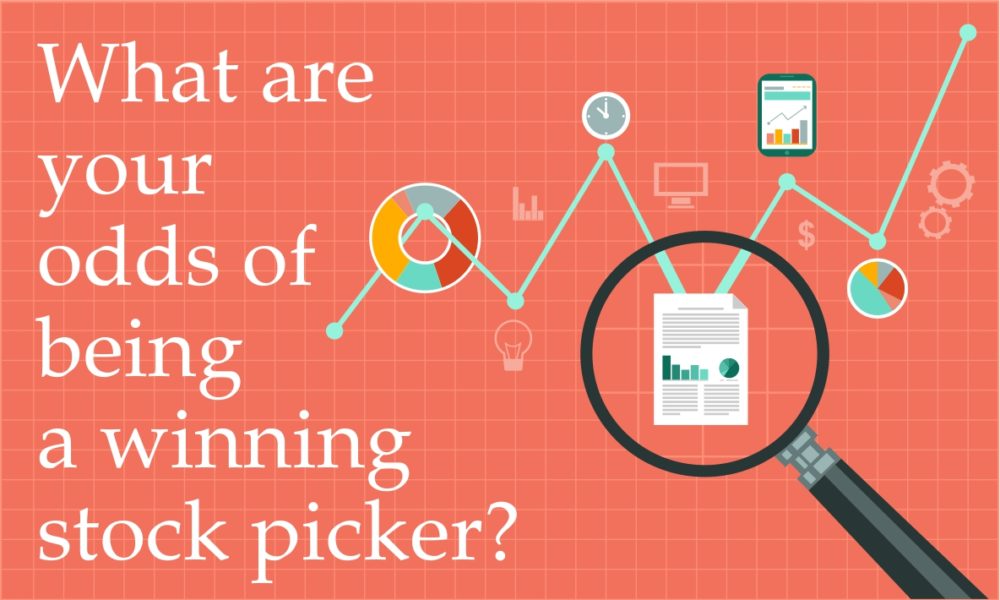

Deprecated: Implicit conversion from float 1758290796.546709 to int loses precision in /www/investmentzen_357/public/blog/wp-content/plugins/intelly-related-posts/includes/classes/utils/Logger.php on line 93
Deprecated: Implicit conversion from float 1758290796.549195 to int loses precision in /www/investmentzen_357/public/blog/wp-content/plugins/intelly-related-posts/includes/classes/utils/Logger.php on line 93

SHARE THIS INFOGRAPHIC ON YOUR SITE WITH THE FOLLOWING CODE:
<p><a href='http://staging.investmentzen.com/news/what-are-your-odds-of-being-a-winning-stock-picker/'><img src='https://investmentzen-569f.kxcdn.com/blog/wp-content/uploads/2017/04/What-Are-Your-Odds-Of-Being-A-Successful-Stock-Picker.jpg' alt='What are Your Odds of Being a Winning Stock Picker?' width='800px' border='0' /></a></p>
<p>Via: <a href="http://staging.investmentzen.com/news/what-are-your-odds-of-being-a-winning-stock-picker/">InvestmentZen.com</a></p>
Picking Stocks:
Using the complete history of the stock market, let’s look at your chances of successfully picking winning individual stocks:
- The median time stocks have stayed on the market is 7 years, which means: you have a 50% chance of picking a stock that will no longer be in the market in 7 years (or less)
- The top 1,000 stocks, or 4% of the entire stock market, account for ALL of the wealth creation of the market, so: you have a 4% chance of picking a stock that will do well
- Experts don’t have better chances than the average investor. One study found that investors following experts’ recommendations during the study period would have lost 3.8% on a risk-adjusted basis over a 6-month holding period.
Timing the Market:
- You have a 50/50 chance of timing the market correctly once. You only have a 25% chance of timing it correctly twice and your chances decrease each time you try.
- The market reacts to announcements. 60% of the wealth creation of the market occurs on important announcement days, but some of the sharpest drops occur on those days as well. Unless you’re constantly paying attention to the market OR just consistently invest, you’re extremely likely to miss these days.
- The S&P 500 has gone up 2 out of every 3 years from 1871 to 2015. If you pull out of the market because of a downturn, you miss the upswings as well which are twice as likely.
- In the history of the market, there is no negative return during any holding period of 21 years or more.
Actively Managed vs. Passively Managed Funds
Over a 10 year period, on an after-tax basis:
- Managers of stock funds for large and mid-sized companies had lower returns than passively managed funds 97% of the time. That means active stocking only improved returns 3% of the time, and this was done by professionals!
- Managers of small-cap stock funds had lower returns than index-style funds 77% of the time.
- The few managed funds that were able to outperform passively managed funds only had a 20% chance of outperforming the passively managed funds the next year and a 10% chance of outperforming them 3 years in a row.
How To Improve Your Odds:
- Dollar Cost Averaging – This is a fancy term for saying “invest consistently.” If you invest the same amount of money every time you get paid regardless of market performance, you will reduce the impact of the market’s volatility on your portfolio by basically buying more stocks when they are at a lower price, therefore getting a better deal.
- Don’t Wait – More time in the market gives you a better chance of positive returns. Don’t try to wait for good market timing.
- Try Index Funds – Index funds allow you to invest in the whole market rather than individual stocks. This allows your portfolio to include all of the 4% wealth building stocks as well as the others. If the market goes up, your investments go up. Index funds decrease the impact to your portfolio of any specific company. Index funds are passively-managed and have lower fees than actively-managed funds.
References:
Bessembinder, Hendrik. “Do Stocks Outperform Treasury Bills?” (2017).
Liang, Bing. “Price pressure: Evidence from the ‘dartboard’ column.” The Journal of Business 72.1 (1999): 119-134.
Savor, Pavel, and Mungo Wilson. “How much do investors care about macroeconomic risk? Evidence from scheduled economic announcements.” Journal of Financial and Quantitative Analysis 48.02 (2013): 343-375.
https://www.forbes.com/sites/simonmoore/2016/03/07/the-myth-of-market-timing
http://executiveeducation.wharton.upenn.edu/thought-leadership/wharton-wealth-management-initiative/wmi-thought-leadership/active-vs-passive-investing-which-approach-offers-better-returns
Liang, Bing. “Price pressure: Evidence from the ‘dartboard’ column.” The Journal of Business 72.1 (1999): 119-134.
Savor, Pavel, and Mungo Wilson. “How much do investors care about macroeconomic risk? Evidence from scheduled economic announcements.” Journal of Financial and Quantitative Analysis 48.02 (2013): 343-375.
https://www.forbes.com/sites/simonmoore/2016/03/07/the-myth-of-market-timing
http://executiveeducation.wharton.upenn.edu/thought-leadership/wharton-wealth-management-initiative/wmi-thought-leadership/active-vs-passive-investing-which-approach-offers-better-returns
